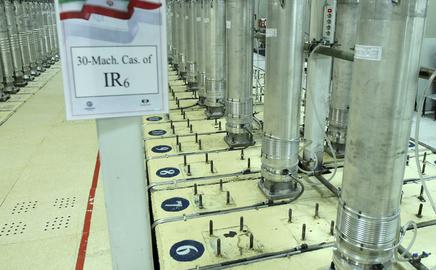Rafael Mariano Grossi, director-general of the International Atomic Energy Agency (IAEA), recently submitted his latest confidential report on Iran’s nuclear program to the agency’s board of governors. The board’s 35 members are now examining it ahead of a meeting scheduled for next week.
Parts of this report were leaked to the media on Tuesday and have been independently verified by IranWire. It reads as the agency’s most pessimistic on Iran’s nuclear activities in eight years.
***
Grossi’s report analyses the current situation of Iran’s nuclear program and the Iranian government’s current level of compliance with the IAEA’s monitoring of its nuclear activities. These include those activities officially covered by the JCPOA.
The Islamic Republic, it says, “has yet to provide the necessary explanation for uranium traces in four locations the agency had not been previously informed of”.
In March 2020, the IAEA reported that it had found uranium traces in three undeclared locations and a radioactive materisals-contaminated installation near Tehran. "The fact that we found traces [of uranium] is very important,” Grossi had said at the time. “That means there is the possibility of nuclear activity and materials that are not under international supervision, about which we do not know the origin or the intent.”
In his new report, Grossi wrote with a note of urgency that this situation seriously affects the agency’s ability to provide confidence about the peaceful nature of Iran’s nuclear program.
He added that on August 24, the Islamic Republic had submitted a letter to the IAEA about its undeclared sites, but the IAEA had determined "parts of the information submitted by Iran are inconsistent with other information”: to whit, that supplied by the IAEA’s own inspectors and nuclear specialists.
In the 1990s and the 2000s Iran behaved the same way toward the IAEA, putting forward information that did not match the official findings. At the time it seemed the Islamic Republic was trying to buy time. The result was IAEA’s investigation into the so-called PMDs, “possible military dimensions”, of Iran’s nuclear program. But that case was closed in December 2015, removing a crucial obstacle to the JCPOA.
“Continuous Undermining of Monitoring Activities”
The second part of the report concerned Iran’s obligations within the framework of the JCPOA. Its findings were more damaging than those linked to Islamic Republic’s violations of its agreements with the IAEA itself.
On June 23 last year, a drone attack on a facility run by Iran Centrifuge Technology Company in Karaj, near Tehran, widely attributed to Israel caused major damage. According to Grossi’s report, one of the cameras in a centrifuge component workshop in Karaj had been destroyed, and another "severely damaged".
These are the same monitoring cameras that were installed after an interim agreement in February 2021 between Iran and the IAEA, following a decision by the Islamic Republic to suspend the implementation of the Additional Protocol, which allowed IAEA inspectors to conduct unannounced inspections of Iran's nuclear facilities.
Iran had announced that at the end of three months, if the US had lifted sanctions on Iran, inspectors would have access to the content of the cameras – otherwise the recordings would be irretrievably erased.
Since 23 February 2021, Grossi wrote, the Agency's verification and monitoring activities had been "seriously undermined" as a result of Iran's decision to stop the implementation of its nuclear-related commitments.
The report also addresses Iran’s growing stockpile of enriched uranium in that, because of its potential for dual use, has always been a point of concern for the IAEA’s board of governors. Due to the lack of access to monitoring cameras, the IAEA has had to estimate that as of August 30, Iran's total enriched uranium stockpile was 2441 kg: somewhat less than the previous quarter. But in addition, Iran has also produced 10 kg of uranium enriched up to 60 percent.
The report concludes that IAEA’s monitoring duties in Iran have been "seriously undermined". Three months ago, while talks in Vienna to revive the JCPOA were still going on, the IAEA’s board of governors delayed adopting a resolution in order to show good faith. Whether that still holds next week remains to be seen.
Related coverage:
Mohammad Eslami: Unassuming Ex-Minister Takes on Iran's Nuclear Brief
Nuclear Acceleration and Rocket Attacks: The Uncertain Future of the JCPOA
Uncertain Future for Nuclear Deal as Rouhani’s Presidency Comes to an End
Iran's Sanjarian Nuclear Site: What Do We Know?
Iran Sets Out Conditions for the Revival of the Nuclear Deal (At Least on Paper)
What Do We Know About the Nuclear Watchdog’s Cameras in Iran?
visit the accountability section
In this section of Iran Wire, you can contact the officials and launch your campaign for various problems

























comments